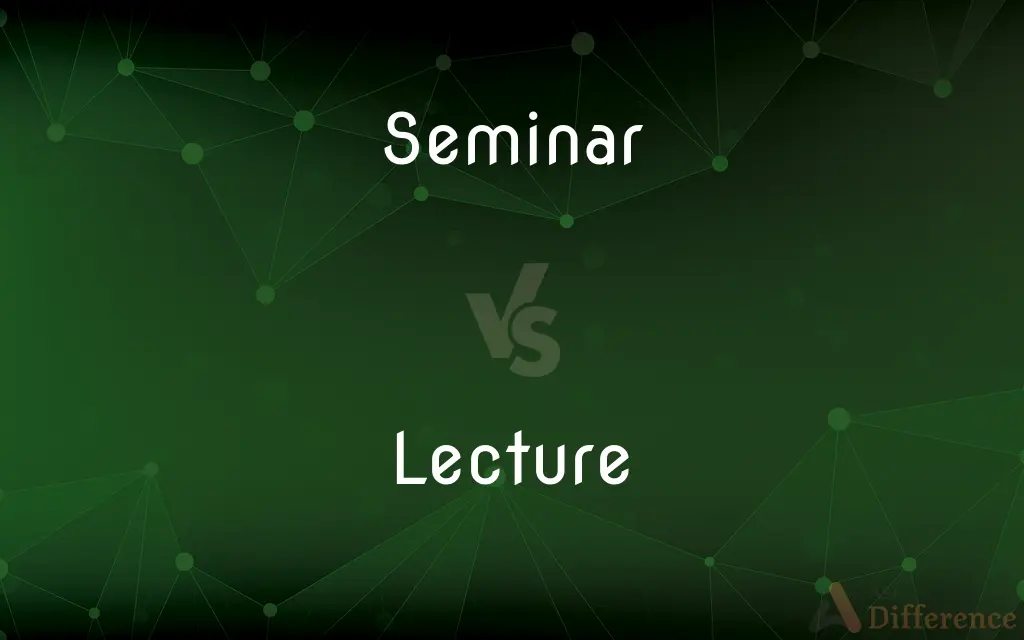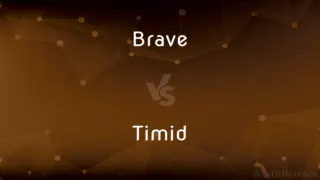Seminar vs. Lecture — What's the Difference?
By Tayyaba Rehman — Updated on September 16, 2023
A seminar is an interactive group meeting for discussion or training, while a lecture is a formal presentation given by an expert to a larger audience. Both are educational, but their formats and purposes differ.

Difference Between Seminar and Lecture
Table of Contents
ADVERTISEMENT
Key Differences
A seminar is typically characterized by a smaller group of participants who actively engage in discussions, often centered around a specific topic or set of readings. In contrast, a lecture is more of a one-sided presentation where an expert imparts knowledge on a subject to an audience, often with limited interaction.
In a seminar, attendees usually come prepared, having done prior readings or research, which they discuss collaboratively. Whereas in a lecture, the audience primarily listens, taking notes, and may have the opportunity to ask questions at the end.
Seminars often encourage participants to share their perspectives, fostering a deeper understanding through dialogue. Lectures, on the other hand, are structured primarily for information dissemination, usually from a singular viewpoint.
The setting for a seminar is usually more informal, with seating arrangements that encourage face-to-face interaction. In a lecture, seating is typically in rows facing the lecturer, emphasizing the direction of information flow.
While both seminars and lectures are valuable educational tools, seminars prioritize collaborative learning and discussions, whereas lectures emphasize knowledge transmission from an authority figure.
ADVERTISEMENT
Comparison Chart
Primary Purpose
Discussion and collaborative learning.
Information dissemination by an expert.
Interactivity
High; participants actively engage.
Low; audience primarily listens.
Typical Setting
Informal, conducive to group discussions.
Formal, audience facing presenter.
Size
Generally smaller groups.
Larger audience.
Preparation
Attendees often do pre-readings or research.
Attendees come to listen and learn.
Compare with Definitions
Seminar
A collaborative meeting focused on discussion or training.
The company organized a seminar on team-building strategies.
Lecture
A formal talk by an expert on a particular subject.
The professor's lecture on quantum mechanics was captivating.
Seminar
An interactive session where participants share ideas on a topic.
The seminar on renewable energy solutions saw many innovative ideas.
Lecture
A spoken lesson or exposition, often given to students.
Missing a crucial lecture can leave a student behind in the syllabus.
Seminar
An academic meeting for intensive discussion on specific readings or topics.
Students presented their research findings at the end-of-term seminar.
Lecture
A talk aiming to impart knowledge on a topic to an audience.
The guest lecture by the renowned author was a huge success.
Seminar
A session aiming at skill development or knowledge enhancement through mutual participation.
The seminar on digital marketing techniques was enlightening.
Lecture
A presentation that usually allows limited interaction with attendees.
The lecture on space exploration was insightful but had a strict Q&A session.
Seminar
A seminar is a form of academic instruction, either at an academic institution or offered by a commercial or professional organization. It has the function of bringing together small groups for recurring meetings, focusing each time on some particular subject, in which everyone present is requested to participate.
Lecture
An educational presentation to a group of listeners.
The lecture on ancient civilizations transported us back in time.
Seminar
A course of study for a small group of students in a college or graduate school, often entailing research under the guidance of a professor.
Lecture
A lecture (from the French lecture, meaning reading) is an oral presentation intended to present information or teach people about a particular subject, for example by a university or college teacher. Lectures are used to convey critical information, history, background, theories, and equations.
Seminar
The group of students in such a course.
Lecture
An exposition of a given subject delivered before an audience or class, as for the purpose of instruction.
Seminar
A scheduled meeting of such a group.
Lecture
An earnest admonition or reproof; a reprimand.
Seminar
A meeting for an exchange of ideas; a conference.
Lecture
To deliver a lecture or series of lectures.
Seminar
A class held for advanced studies in which students meet regularly to discuss original research, under the guidance of a professor.
Lecture
To deliver a lecture to (a class or audience).
Seminar
A meeting held for the exchange of useful information by members of a common business community.
Lecture
To admonish or reprove earnestly, often at length
Always lecturing me about my manners.
Seminar
A group of students engaged, under the guidance of an instructor, in original research in a particular line of study, and in the exposition of the results by theses, lectures, etc.; - formerly called also seminary, now seldom used in this sense.
Lecture
A spoken lesson or exposition, usually delivered to a group.
During class today the professor delivered an interesting lecture.
Seminar
Any meeting for an exchange of ideas
Lecture
(by extension) a class that primarily consists of a (weekly or other regularly held) lecture (as in sense 1) [usually at college or university]
We will not have lecture tomorrow.
Lecture notes are online.
Seminar
A course offered for a small group of advanced students
Lecture
A berating or scolding.
I really don't want you to give me a lecture about my bad eating habits.
Seminar
A group meeting emphasizing participant interaction.
The marketing seminar allowed employees to brainstorm together.
Lecture
(obsolete) The act of reading.
The lecture of Holy Scripture
Lecture
(ambitransitive) To teach (somebody) by giving a speech on a given topic.
The professor lectured to two classes this morning.
Lecture
(transitive) To preach, to berate, to scold.
Emily's father lectured her about the importance of being home before midnight.
Lecture
The act of reading; as, the lecture of Holy Scripture.
Lecture
A discourse on any subject; especially, a formal or methodical discourse, intended for instruction; sometimes, a familiar discourse, in contrast with a sermon.
Lecture
A reprimand or formal reproof from one having authority.
Lecture
A rehearsal of a lesson.
Lecture
To read or deliver a lecture to.
Lecture
To reprove formally and with authority.
Lecture
To deliver a lecture or lectures.
Lecture
A speech that is open to the public;
He attended a lecture on telecommunications
Lecture
A lengthy rebuke;
A good lecture was my father's idea of discipline
The teacher gave him a talking to
Lecture
Teaching by giving a discourse on some subject (typically to a class)
Lecture
Deliver a lecture or talk;
She will talk at Rutgers next week
Did you ever lecture at Harvard?
Lecture
Censure severely or angrily;
The mother scolded the child for entering a stranger's car
The deputy ragged the Prime Minister
The customer dressed down the waiter for bringing cold soup
Common Curiosities
What is the main goal of a seminar?
A seminar aims to foster discussion and collaborative learning, while a lecture imparts knowledge.
Can lectures be interactive?
While lectures primarily involve listening, some may have interactive elements, unlike seminars which are inherently interactive.
Do I need to prepare before attending a seminar?
Yes, seminar attendees often do pre-readings or research, whereas for a lecture, preparation is optional.
Is a workshop similar to a seminar?
A workshop is hands-on and practical, like a seminar, but a lecture is more about information delivery.
How long does a lecture typically last?
A lecture duration varies but is often about an hour, while seminars might be longer due to discussions.
How are seminars and lectures evaluated?
Lectures are often evaluated based on content delivery, while seminars might be assessed on participant engagement.
Which promotes active learning, seminar or lecture?
Seminars promote active learning through discussions, whereas lectures focus on passive knowledge acquisition.
Which is larger, a seminar or lecture?
Lectures typically accommodate larger audiences, while seminars are for smaller groups.
Are seminars formal events?
Seminars are generally more informal than lectures, encouraging open discussion.
Why are lectures important?
Lectures provide knowledge from an expert, giving a foundation which seminars can then expand on through discussion.
Can seminars be online?
Yes, both seminars and lectures can be conducted online, especially with modern technology.
Can one person conduct a seminar?
While one person can lead, seminars involve many speaking, unlike lectures led by an individual or few.
Do lectures always have visuals?
Not always. While many lectures use visuals to aid understanding, seminars may or may not have them.
Can anyone speak in a seminar?
Typically, in a seminar, participants are encouraged to share, unlike in a lecture where a select few speak.
Are seminars always academic?
No, seminars can be for various purposes, not just academic, whereas lectures are often academic.
Share Your Discovery

Previous Comparison
Heat vs. Temperature
Next Comparison
Brave vs. TimidAuthor Spotlight
Written by
Tayyaba RehmanTayyaba Rehman is a distinguished writer, currently serving as a primary contributor to askdifference.com. As a researcher in semantics and etymology, Tayyaba's passion for the complexity of languages and their distinctions has found a perfect home on the platform. Tayyaba delves into the intricacies of language, distinguishing between commonly confused words and phrases, thereby providing clarity for readers worldwide.
















































